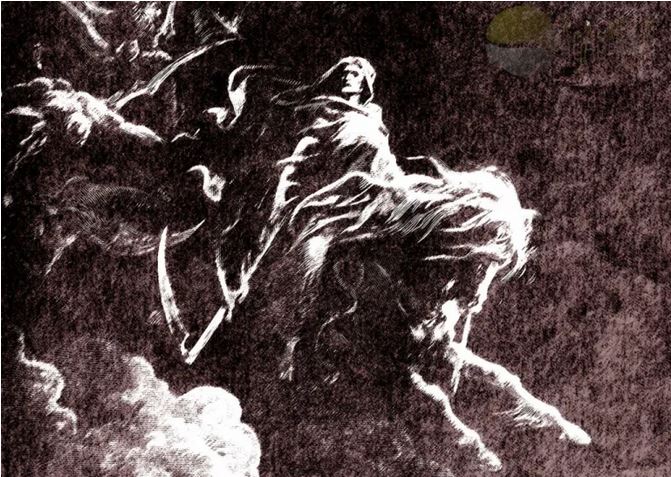By Brandon Marlon (January 2024)

10/7 (Black Sabbath)
=
Under cover of twilight and barrage,
forces minatory and abominable
(headbanded marionettes leagued
with turbaned puppeteers)
obtruded beyond barriers in an irruption
foreseen yet discounted as improbable
by lulled and duped ideologues lamentably
responsible for defending their fellows.
–
Godless savages advantaged by surprise
unleashed as schemed a host of horrors
on innocents unsuspecting and susceptible
within idyllic houses and kibbutzim
and against those uniformed and barracked,
dozing in army bases, soon gunned down and gassed
as were their forebears within living memory.
–
Fueled by animus and amphetamines,
rampaging pogromists visited depravities
upon victims felled by bullet, explosive, fire,
their corpses mutilated for amusement;
women were regarded as genitalia
ripe for penetration and gang-raped
by their sexually frustrated assaulters.
–
Babies lay beheaded else baked to a crisp
while slaughterous and plunderous perpetrators
guzzled refrigerated beverages for refreshment.
–
Pillaged like spoils, hostages were hauled away
on motorbikes or in the beds of pickup trucks
bound for secret hideouts and underground lairs,
their fates in the stained hands of their abductors.
–
Succor was absent amid border communities
crimsoned by blood, blackened by flame.
The fightback proved sluggish the day of,
as would be the counter-invasion that ensued.
–
Yet the heinous—keen to scuttle coexistence
among neighbors via the terrorist’s veto—
unwittingly annealed a nation woebegone
but unique, a people that dwells apart,
not merely longevous but amaranthine.
Flautist amid Ruins
“Anyone who plays music will find peace”,
he insists, perched upon a heap of rubble
comprising bent rebar and cinder blocks,
formerly his apartment in Rafah.
–
Each morn he bypasses piles of debris
and brews a pot of sugared tea,
then pipes on a metal tube perforated with holes
for his progeny and neighboring munchkins,
his plaintive, melodious notes
occasionally accompanied
by the percussion of blasts and buildings
collapsing in the background.
–
Music, for him, is a form of jihad,
though against what or whom
he refrains from specifying;
his instrument is his catharsis,
purging innermost emotions
long after words have fled for safety.
–
Bound to his birthplace by sentimental chains,
he refuses to evacuate the battleground,
unable to conceive of himself elsewhere,
unwilling to estrange himself, even for an instant,
from the rhythms of his safest zone.
Gaza Girl
She sleeps on a blanket in a closed military camp;
a reservist in the combat engineering corps
stumbles upon her miniature frame and notices
her feet wounded undoubtedly by her unshod trek
through shattered grounds during wartime.
The soldier appraises her to be four years old
and as lost as can be after taking a wrong turn off
Salah ad-Din road and wandering toward
the army’s Jerusalem Brigade, currently
hunkering down in the center of the Strip.
He and a peer from the civil administration
treat her wounds, bandage her feet, clean her hands
with wipes, pinch dust and snot from her nostrils,
spray her with insect repellent to ward off flies,
and give her bottled water, which she nips in a daze.
Just who are these strange-tongued men,
helmeted and vested, in olive-colored uniforms?
she wonders as she scratches her head,
while one of them squeezes her limbs
and back to check that nothing is broken.
Arrangements are made for a Red Crescent
ambulance to transfer her to Arab medics.
The short-order hand-off involves a handful
of armed and alert infantrymen, one of whom
carries the girl and is careful to place her
within the ambulance driver’s arms,
not directly in the vehicle,
for fear of threats hidden within.
Unbeknownst to her, the straying girl
engendered compassion amidst conflict,
an opportunity for humaneness to remind
all beings of a beauty sublime.
War Zone Wildlife
Winter’s early rains spur blooming flowers
whose nectar attracts the Painted Lady butterfly
even as massive colonies of winged ants
supply protein to a pair of golden jackals
snacking before discreetly roaming fields
during their courtship season; in the dark,
nocturnal natives like the mongoose
and wild boar keep an eye out
for an invasive species—wild dogs
escaping from the Strip—sure to disrupt
the mating season of deer come next spring.
Meanwhile, just a few miles away in Gaza,
whence the cacophony of artillery and airstrikes
echoes into the Bsor Stream region,
fugitive monkeys formerly caged in the local zoo
now occupy a house and perch atop the roof,
dangle from the window, or lounge on the balcony,
causing soldiers conducting surveillance
from afar to wonder whether combat fatigue
sometimes induces hallucination.
Table of Contents
Brandon Marlon is a writer from Ottawa, Canada. He received his B.A. in Drama & English from the University of Toronto and his M.A. in English from the University of Victoria. His poetry was awarded the Harry Hoyt Lacey Prize in Poetry (Fall 2015), and his writing has been published in 300+ publications in 32 countries.
Follow NER on Twitter @NERIconoclast
- Like
- Digg
- Tumblr
- VKontakte
- Buffer
- Love This
- Odnoklassniki
- Meneame
- Blogger
- Amazon
- Yahoo Mail
- Gmail
- AOL
- Newsvine
- HackerNews
- Evernote
- MySpace
- Mail.ru
- Viadeo
- Line
- Comments
- SMS
- Viber
- Telegram
- Subscribe
- Skype
- Facebook Messenger
- Kakao
- LiveJournal
- Yammer
- Edgar
- Fintel
- Mix
- Instapaper
- Copy Link







2 Responses
that’s first-rate, thanks!
Heartbreaking and Spirit stirring.